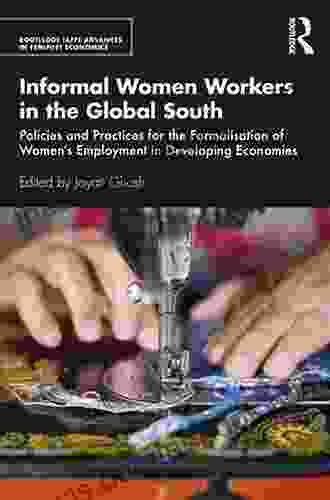Informal Women Workers in the Global South: Challenges, Contributions, and Strategies for Empowerment

Informal women workers play a crucial role in the economies and societies of the Global South. Despite their significant contributions, they often face numerous challenges, including low pay, lack of job security, and limited access to social protection. This article delves into the experiences of informal women workers, highlighting their challenges, recognizing their contributions, and exploring strategies for their empowerment.
4.4 out of 5
| Language | : | English |
| File size | : | 3438 KB |
| Text-to-Speech | : | Enabled |
| Enhanced typesetting | : | Enabled |
| Word Wise | : | Enabled |
| Print length | : | 227 pages |
| Screen Reader | : | Supported |
Challenges Faced by Informal Women Workers
Low Pay and Poverty
Informal women workers often earn meager wages, struggling to meet their basic needs. They are frequently employed in low-skill jobs with minimal training and no opportunities for career advancement. This low pay often perpetuates a cycle of poverty, making it difficult for women to escape economic hardship.
Lack of Job Security
Informal work is often characterized by a lack of job security. Informal women workers typically work on a contract basis or as day laborers, with no guaranteed income or employment duration. This uncertainty makes it challenging to plan for the future, access healthcare, and secure housing.
Limited Access to Social Protection
Informal women workers often lack access to essential social protection benefits such as health insurance, maternity leave, and unemployment benefits. Without these protections, they are vulnerable to economic shocks and health risks, further exacerbating their economic and social challenges.
Discrimination and Marginalization
Informal women workers frequently face discrimination and marginalization based on their gender and economic status. They may be subjected to sexual harassment, violence, and exclusion from decision-making processes. This discrimination creates barriers to their economic empowerment and overall well-being.
Contributions of Informal Women Workers
Despite the challenges they face, informal women workers make significant contributions to their communities and economies:
Economic Contributions
Informal women workers contribute to economic growth by generating income and supporting their families. They participate in various sectors, including retail, street vending, food preparation, and domestic work. Their labor plays a vital role in local economies and supports formal businesses.
Household and Community Support
Informal women workers often provide vital care and support for their households and communities. They are responsible for childcare, cooking, cleaning, and other essential household tasks. Their contributions free up time for other family members to participate in economic activities.
Cultural and Social Impact
Informal women workers are often involved in preserving and transmitting cultural traditions through their work. Street vendors, for example, offer traditional foods and crafts that contribute to the cultural heritage of their communities.
Strategies for Empowering Informal Women Workers
Empowering informal women workers requires a multifaceted approach involving policy interventions, social protection measures, and community-based initiatives:
Policy Interventions
* Governments should establish policies that recognize and protect informal workers' rights, including minimum wage guarantees, social security benefits, and access to healthcare. * Legal frameworks should be strengthened to address discrimination and harassment faced by informal women workers.
Social Protection Measures
* Social protection programs should be expanded to provide health insurance, maternity benefits, and unemployment benefits to informal workers. * Access to childcare facilities should be improved to enable women to participate in the workforce more effectively.
Community-Based Initiatives
* Community-based organizations and women's networks can provide support to informal women workers, offering training, business development assistance, and advocacy. * Cooperatives and self-help groups can empower informal women workers by collective action and economic solidarity.
Education and Skill Development
* Informal women workers should have access to education and training opportunities to enhance their skills and earning potential. * Government agencies and NGOs can provide vocational training and literacy programs tailored to their needs.
Informal women workers in the Global South face significant challenges, but their contributions to economies and societies are immense. By implementing strategies that address these challenges and empower these women, we can promote gender equality, reduce poverty, and foster more inclusive economic growth. Recognizing and valuing their work is not only a matter of social justice but also an investment in the well-being of our communities and the prosperity of our economies.
4.4 out of 5
| Language | : | English |
| File size | : | 3438 KB |
| Text-to-Speech | : | Enabled |
| Enhanced typesetting | : | Enabled |
| Word Wise | : | Enabled |
| Print length | : | 227 pages |
| Screen Reader | : | Supported |
Do you want to contribute by writing guest posts on this blog?
Please contact us and send us a resume of previous articles that you have written.
 Book
Book Chapter
Chapter Text
Text Story
Story Genre
Genre Magazine
Magazine Bookmark
Bookmark Bibliography
Bibliography Foreword
Foreword Preface
Preface Synopsis
Synopsis Annotation
Annotation Footnote
Footnote Manuscript
Manuscript Scroll
Scroll Bestseller
Bestseller Classics
Classics Autobiography
Autobiography Reference
Reference Dictionary
Dictionary Character
Character Catalog
Catalog Borrowing
Borrowing Archives
Archives Periodicals
Periodicals Research
Research Scholarly
Scholarly Lending
Lending Reserve
Reserve Academic
Academic Journals
Journals Reading Room
Reading Room Special Collections
Special Collections Interlibrary
Interlibrary Literacy
Literacy Thesis
Thesis Dissertation
Dissertation Awards
Awards Reading List
Reading List Theory
Theory Arthur Mason
Arthur Mason Martin Stewart
Martin Stewart Lester D Taylor
Lester D Taylor Emma Glass
Emma Glass Michael Fitterling
Michael Fitterling J A Pardo
J A Pardo David Cromwell
David Cromwell Jukka Aalho
Jukka Aalho Matthew Ford
Matthew Ford Barbara Brackman
Barbara Brackman Jonathan Holslag
Jonathan Holslag Giorgio Agamben
Giorgio Agamben A B Jamieson
A B Jamieson Nathan Burgoine
Nathan Burgoine Rossella Di Paolo
Rossella Di Paolo Jason Stein
Jason Stein Angela Buckley
Angela Buckley Stacie Taranto
Stacie Taranto William C Oakes
William C Oakes Janice Inman
Janice Inman
Light bulbAdvertise smarter! Our strategic ad space ensures maximum exposure. Reserve your spot today!

 Tennessee WilliamsThe Enchanting Evolution of Figure Skating: A Journey Through Grace and...
Tennessee WilliamsThe Enchanting Evolution of Figure Skating: A Journey Through Grace and... Boris PasternakFollow ·10.7k
Boris PasternakFollow ·10.7k Jack ButlerFollow ·2.2k
Jack ButlerFollow ·2.2k Corey HayesFollow ·7.3k
Corey HayesFollow ·7.3k Chuck MitchellFollow ·15.2k
Chuck MitchellFollow ·15.2k Cruz SimmonsFollow ·14.2k
Cruz SimmonsFollow ·14.2k Elton HayesFollow ·15.2k
Elton HayesFollow ·15.2k Edgar HayesFollow ·5.4k
Edgar HayesFollow ·5.4k Ralph TurnerFollow ·14.4k
Ralph TurnerFollow ·14.4k

 Russell Mitchell
Russell MitchellGCSE Set Text Student Edition: Collins Classroom Classics...
The GCSE Set Text Student Edition: Collins...

 Ralph Turner
Ralph TurnerSix Sigma Lean Green Belt Training for Beginners with...
What is Six...

 Travis Foster
Travis Foster10 Life-Changing Lessons I Learned When I Was Single
Being single can...

 Jermaine Powell
Jermaine PowellOne Great Insight Is Worth a Thousand Good Ideas
In the competitive and...
4.4 out of 5
| Language | : | English |
| File size | : | 3438 KB |
| Text-to-Speech | : | Enabled |
| Enhanced typesetting | : | Enabled |
| Word Wise | : | Enabled |
| Print length | : | 227 pages |
| Screen Reader | : | Supported |














